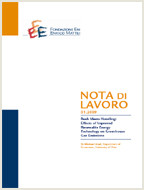Smart-Grids and Climate Change. Consumer adoption of smart energy behaviour: a system dynamics approach to evaluate the mitigation potential.

01.09.2013
Elena Claire Ricci
C61, Q42, Q54
Smart-Grids, Demand Response, Demand Management, System Dynamics, Consumer Choices, Climate Policy
Climate Change and Sustainable Development
Carlo Carraro
We build a system dynamics model to evaluate the potential dynamics of consumer adoption of “Smart Energy Behaviour”. Within this term we include different levels of: i) shift in electricity consumption towards less costly-less polluting and congestioning hours; ii) the reduction of mainly wasteful electricity consumption, that maintains similar levels of comfort; iii) the enrolment in demand response programs; iv) electricity generation via residential micro-photovoltaic (PV) systems. These behavioural changes are triggered by the installation of advanced metering systems and a tariff policy that prices electricity according to time-of-use. The context analysed is that of Italy, where the largest diffusion of smart meters has taken place. We perform a set of 2500 simulations of our model with stochastic parameters to take into account the uncertainty in their estimation, to find that on average consumer involvement may induce on aggregate a shift in residential electricity consumption of 13.0% by 2020 and of 29.6% by 2030; and reduction in residential electricity consumption (just by reducing wasteful consumption) of 2.5% by 2020 and 9.2% by 2030. These consumption changes may have strong impacts on the system operating costs (in the order of 380 M€/y by 2020, 1203 M€/y by 2030), on the CO2 emissions (in the order of 1.56 MtonCO2/y by 2020, 5.01 Mton CO2/y by 2030), confirming the value of consumer participation.
***
Suggested citation: Ricci, E.C. (2013), ‘Smart-Grids and Climate Change. Consumer adoption of smart energy behaviour: a system dynamics approach to evaluate the mitigation potential. ’, Nota di Lavoro 71.2013, Milan, Italy: Fondazione Eni Enrico Mattei.
